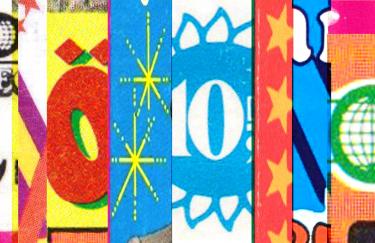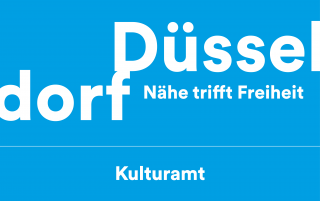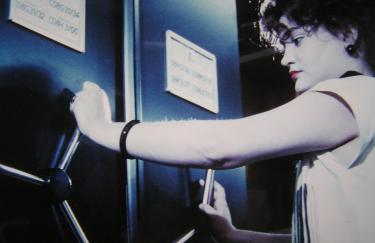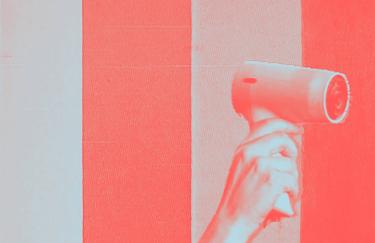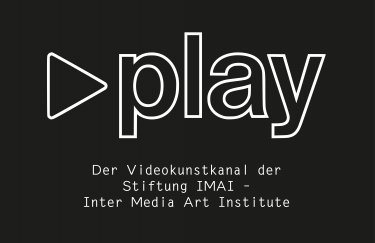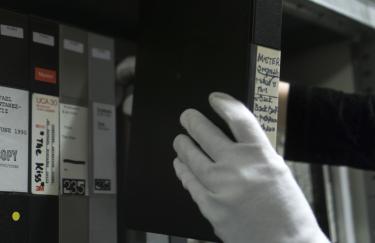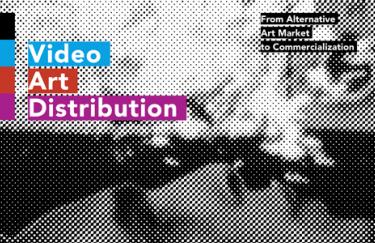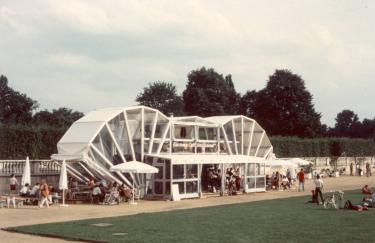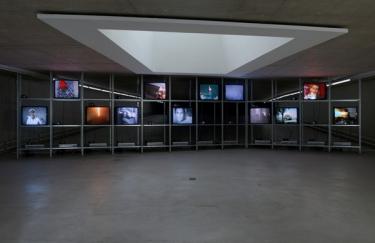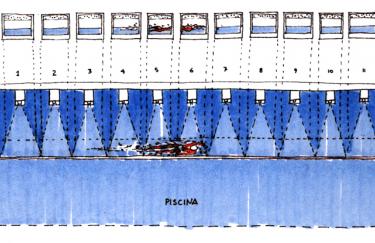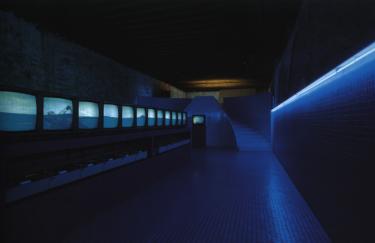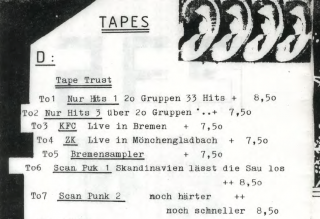
The Cassette Underground
Archiving Cultures of Alternative Distribution in North Rhine-Westphalia, 1970s-1990s
Date
15.12.2021 - 30.06.2022Even though the tape cassette is mostly appreciated as a nostalgic technology at this point, it has lastingly shaped the production, distribution and consumption of contemporary music and visual culture. From the late 1970s up until the mid-1990s, inexpensive, portable and durable compact cassettes afforded users with little economic means, technical skills or promotional prowess to conveniently record and share their own music. This led to a lasting democratization of the music industry with marginalized genres and styles proliferating on informal markets.
Among the most important breakthroughs of the cassette revolution was the establishment of alternative distribution systems through locally centralized subcultures as well as decentralized mail networks and underground channels of communication, such as fanzines and radio shows. Beyond the top-down mainstream distribution mechanisms, new approaches of peer-to-peer circulation were taken up such as the mail order systems, personal exchange or the direct sale through street vendors, blurring the boundaries between producer, distributor and consumer. What emerged in this process were not just shadow economies, but lively communities of like-minded listeners, connected by a shared interest in sounds and visuals that were considered too loud, too foreign, and just too far out for the mainstream.
It is important to note that we do not consider tape cassettes to be an intrinsically non-commercial, democratic, or equalizing technology. Instead, we believe that these are only some of the affordances of compact cassettes that have been recognized and actualized by certain groups of users who have grown into communities of shared interest in the process. This is why this project sets out to understand three different approaches to cassette culture that proliferated in North Rhine Westphalia between the 1970s and the 1990s: (1) the Punk community, (2) the community of Turkish migrant workers, and (3) the community of visual artists. By listening to private and public music collections, analyzing fanzine and other alternative publications, and conducting interviews with eye and ear witnesses of the time, we strive to unravel how alternative cultures of music production, distribution and consumption evolved over the decades, and find out how these cultures – commonly referred to as the ‘cassette underground’ - can help us navigate the structures and conventions of the digital music industries of the 21st century.
As we are researching the production and distribution mechanisms of the cassette underground, we also want to reflect on the circumstances that allow us to dive into those histories today. These conditions are shaped by four very different approaches to media art archiving, represented by the initiatives of (1) artist tape diggers, (2) media art distributors, (3) community archiving associations, and (4) political archiving associations.
Tape diggers (1) have gained popularity over the last decade as artists from all kinds of disciplines started to collect tapes from specific subcultures, such as the Düsseldorf Punk scene or the biggest exports of Turkish folk music, to appropriate them for their musical as well as visual pursuits, ranging from DJ sets to compilations. The artists are primarily driven by their artistic ambition, so they are selecting tapes according to specific aesthetic criteria that they can market in the current music industry. At the same time, the digging process also involves a considerable amount of research that tends to turn these artists into archivists with considerable knowledge of their subject matter. The Essen Interkultur Ruhr initiative has been working with archive diggers for several years, and developed a critical perspective on their practice.
The Düsseldorf Inter Media Art Institute (IMAI) (2) is a non-profit foundation that has taken over the distribution business of the Cologne media art agency 235 Media and continues to run it while also functioning as a media art archive. The foundation can thus be understood to keep the mechanisms of late 1970s media art distribution alive, even though it lacks most of the musical cassettes that 235 Media used to distribute in the late 1970s and early 1980s, because these have been sold long before the foundation was founded. As the cassette distribution business has been among the first and most elaborate ones in North Rhine Westphalia, we consider it essential to finally chart its history and scope.
The Cologne Documentation Centre and Museum of Migration in Germany (DOMiD) (3) is a non-profit association founded by migrants to build a collection of objects and reports, documenting the diverse history of migration in Germany. By focusing on social, cultural and microhistorical testimonials, the institution has compiled a considerable amount of grey literature, newspapers, magazines and cassettes produced by and for Turkish migrants in Germany. Surveying these materials will certainly provide exceptional insights into the ways in which dedicated communities developed around various kinds of musical genres of Turkish music in North Rhine Westphalia, ranging from traditional folk music, "guest worker ballads", protest songs, and "Schlager" to Hip hop.
The Duisburg Archiv für alternatives Schrifttum (Afas) (4) is a non-profit association committed to archiving documents and publications from new social movements in Germany and North Rhine Westphalia in particular. Its dedication to decentral, local and alternative histories have brought about a significant collection of grey literature, newspapers, brochures, flyers, posters and cassettes from all kinds of political initiatives, including those of migrant groups, labor union movements, the musical underground, and youth culture. With a variety of fanzines and other alternative publications, this archive provides a unique point of entry into the histories of alternative distribution of various musical subcultures in North Rhine Westphalia.
We are convinced that the combination of these four archival approaches with their fundamentally different accessioning methods will provide new insights into the ways in which different cultures of alternative distribution have formed as well into the ways in which they have sustained themselves. On top of that, we should be able to reflect on the challenges of archiving and accessing subcultural materials in obsolete media such as cassettes and magazines as well as in new media such as online platforms. After the research phase, the results will be summarized and presented in a series of public events, so that they can be discussed in the context of other academic as well as artistic contributions.
